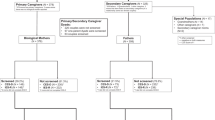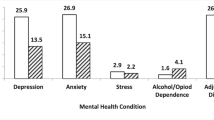Abstract
Objective:
This study describes mental health treatment and follow-up for mothers of infants in a Neonatal Intensive Care Unit (NICU).
Study Design:
Data were collected retrospectively about 204 mothers referred to a Level 3 NICU Psychiatric Consult Liaison Team over 2 years. This included medical, demographic and treatment information about both mother and infant.
Result:
Most mothers (69%) were referred within a week of birth, and 100 (49%) of the referred mothers received a psychiatric diagnosis. Psychiatric follow-up was recommended for 13% on leaving the NICU and additional follow-up referrals were made for another 16%. Mothers with more than one initial reason for referral, a past psychiatric history, receiving therapeutic services, receiving a psychiatric diagnosis and receiving pharmacotherapy were all significantly more likely to have follow-up recommended on discharge.
Conclusion:
Approximately one-sixth of mothers in the NICU were referred, a large proportion received a psychiatric diagnosis, and over a quarter required follow-up after discharge, indicating the importance of the service.
This is a preview of subscription content, access via your institution
Access options
Subscribe to this journal
Receive 12 print issues and online access
$259.00 per year
only $21.58 per issue
Buy this article
- Purchase on Springer Link
- Instant access to full article PDF
Prices may be subject to local taxes which are calculated during checkout

Similar content being viewed by others
References
Carter JD, Mulder RT, Bartram AF, Darlow BA . Infants in a neonatal intensive care unit: parental response. Arch Dis Child Fetal Neonatal Ed 2005; 90: F109–F113.
Singer LT, Salvator A, Guo S, Collin M, Lillen L, Baley J . Maternal psychological distress and parenting stress after the birth of a very low-birth-weight infant. JAMA 1999; 281 (9): 799–805.
Ip S, Chung M, Raman G, Chew P, Magula N, Devine D et al Breastfeeding and Maternal and Infant Health Outcomes in Developed Countries. Agency for Healthcare Research and Quality: Rockville, MD, 2007 p 130.
Ali NS, Mahmud S, Khan A, Ali BS . Impact of postpartum anxiety and depression on child’s mental development from two peri-urban communities of Karachi, Pakistan: a quasi-experimental study. BMC Psychiatry 2013; 13: 274.
Friedman SH, Resnick PJ . Postpartum depression: an update. Womens Health (Lond Eng) 2009; 5 (3): 7–295.
Elkin I, Shea MT, Watkins JT, Imber SD, Sotsky SM, Collins JF et al. National Institute of Mental Health Treatment of Depression Collaborative Research Program: general effectiveness of treatments. Arch Gen Psychiatry 1989; 46 (11): 971–982.
O’Hara M, Stuart S, Gorman LL, Wenzel A . Effect of interpersonal psychotherapy for postpartum depression. Arch Gen Psychiatry 2000; 57 (11): 1039–1045.
Friedman SH, Yang SN, Parsons S, Amin J . Maternal mental health in the Neonatal Intensive Care Unit. NeoReviews 2011; 12 (2): e1–e9.
Cox JL, Murray D, Chapman G . A controlled study of the onset, duration and prevalence of postnatal depression. Br J Psychiatry 1993; 65: 445–453.
O’Hara MW, Swain AM . Rates and risk of postpartum depression-a meta-analysis. Int Rev Psychiatry 1996; 8 (1): 37–54.
Ross LE, McQueen K, Vigod S, Dennis CL . Risk for postpartum depression associated with assisted reproductive technologies and multiple births: a systematic review. Hum Reprod Update 2011; 17 (1): 96–106.
Mounts KO . Screening for maternal depression in the neonatal ICU. Clin Perinatol 2009; 36 (1): 137–152.
Wenzel A, Haugen EN, Jackson LC, Brendle JR . Anxiety symptoms and disorders at eight weeks postpartum. J Anxiety Disord 2005; 19 (3): 295–311.
Hynan MT, Mounts KO, Vanderbilt DL . Screening parents of high-risk infants for emotional distress: rationale and recommendations. J Perinatol 2013; 33: 748–753.
Ballard AR, Friedman SH, Shand JP, Martin R, Hack M . Postpartum Depression and Anxiety among Mothers of Infants in the Neonatal Intensive Care Unit. Presented at American Psychiatric Association Annual Meeting: San Francisco, 2013.
Friedman SH, Kessler RA, Martin R . Psychiatric help for caregivers of infants in Neonatal Intensive Care. Psychiatr Serv 2009; 60 (4): 554.
Friedman SH, Kessler A, Yang SN, Parsons S, Friedman H, Martin RJ . Delivering perinatal psychiatric services in the neonatal intensive care unit. Acta Paediatr 2013; 102: e392–e397.
Statistics New Zealand [Internet]. New Zealand: 2013 Census Quickstats about national highlights. Cultural Diversity; 3 December 2013 [cited 24 February 2014]; [about 2 screens]. Available from http://www.stats.govt.nz/Census/2013-census/profile-and-summary-reports/quickstats-about-national-highlights/cultural-diversity.aspx.
Davis L, Edwards H, Mohay H, Wollin J . The impact of very premature birth on the psychological health of mothers. Early Hum Dev 2003; 73 (1-2): 61–70.
American Psychiatric Association Diagnostic and Statistical Manual of Mental Disorders. Revised 4th edn. Author: Washington, DC, 2000.
Barker ED . The duration and timing of maternal depression as a moderator of the relationship between dependent interpersonal stress, contextual risk and early child dysregulation. Psychol Med 2013; 43 (8): 1587–1596.
Webster-Stratton C, Hammond M . Maternal depression and its relationship to life stress, perceptions of child behaviour problems, parenting behaviours, and child conduct problems. J Abnorm Child Psychol 1988; 16 (3): 299–315.
Lovejoy MC, Graczyk PA, O’Hare E, Neuman G . Maternal depression and parenting behaviour: A meta-analytic review. Clin Psychol Rev 2000; 20 (5): 561–592.
Challacombe F, Salkovskis P . A preliminary investigation of the impact of maternal obsessive-compulsive disorder and panic disorder on parenting and children. J Anxiety Disord 2009; 23 (7): 848–857.
Shaw RJ, Deblois T, Ikuta L, Ginzburg K, Fleisher B, Koopman C . Acute stress reactions among parents of infants in the Neonatal Intensive Care Nursery. Psychosomatics 2006; 47 (3): 206–212.
Misund AR, Nerdrum P, Braten S, Pripp AH, Diseth TH . Long-term risk of mental health problems in women experiencing preterm birth: a longitudinal study of 29 mothers. Ann Gen Psychiatry 2013; 12: 33.
Ghrobani M, Dolatian M, Shams J, Alavi-Majd H, Tavakolian S . Factors associated with posttraumatic stress disorder and its coping styles in parents of preterm and full-term infants. Global J Health Sci 2014; 6 (3): 65–73.
Friedman SH, Resnick PJ, Rosenthal MB . Postpartum psychosis. Curr Psychiatry 2009; 8 (2): 40–46.
Benfield DG, Leib SA, Reuter J . Grief response of parents after referral of the critically ill newborn to a regional center. NEJM 1976; 294: 975–978.
Holditch-Davis D, Miles MS . Mothers’ stories about their experiences in the Neonatal Intensive Care Unit. Neonatal Netw 2000; 19 (3): 13–21.
Hughes P, Riches S . Psychological aspects of perinatal loss. Curr Opin Obstet Gynecol 2003; 15: 107–111.
Eccleston C, Palermo TM, Fisher E, Law E . Psychological interventions for parents of children and adolescents with chronic illness. Cochrane Database Syst Rev 2012; 8: 1–131.
Brett J, Staniszewska S, Newburn M, Jones N, Taylor L . A systematic mapping review of effective interventions for communicating with, supporting and providing information to parents of preterm infants. BMJ Open 2011; 1: e000023.
Jotzo M, Poets CF . Helping parents cope with the trauma of premature birth: an evaluation of a trauma-preventive psychological intervention. Pediatrics 2005; 115 (4): 915.
Melnyk BM, Feinstein NF, Alpert-Gillis L, Fairbanks E, Crean HF, Sinkin RA et al. Reducing premature infants’ length of stay and improving parents’ mental health outcomes with the Creating Opportunities for Parent Empowerment (COPE) Neonatal Intensive Care Unit Program: a randomized, controlled trial. Pediatrics 2006; 118 (5): e1414–e1427.
Turner M, Winefield H, Chur-Hansen A . The emotional experiences and supports for parents with babies in a neonatal nursery. Adv Neonatal Care 2013; 13 (6): 438–446.
Bloch M, Rotenberg N, Koren D, Klein E . Risk factors for early postpartum depressive symptoms. Gen Hosp Psychiatry 2006; 28 (1): 3–8.
Hughes PM, Turton P, Evans CDH . Stillbirth as a risk factor for depression and anxiety in the subsequent pregnancy: cohort study. BMJ 1999; 318 (7200): 1721–1724.
Earls MF . Incorporating recognition and management of perinatal and postpartum depression into pediatric practice. Pediatrics 2010; 126: 1032–1039.
Olson AL, Kemper KJ, Kelleher KJ, Hammond CS, Zuckerman BS, Dietrich AJ . Primary Care Pediatricians’ roles and perceived responsibilities in the identification and management of maternal depression. Pediatrics 2002; 110 (6): 1169–1176.
Heneghan AM, Silver EJ, Bauman LJ, Stein REK . Do pediatricians recognize mothers with depressive symptoms? Pediatrics 2000; 106 (6): 1367–1373.
Acknowledgements
We wish to thank the Kate Edger Trust for funding, the members of the Starship Consult Liaison Team, and staff of the Starship Neonatal Intensive Care Unit.
Author information
Authors and Affiliations
Corresponding author
Ethics declarations
Competing interests
The authors declare no conflict of interest.
Rights and permissions
About this article
Cite this article
Penny, K., Friedman, S. & Halstead, G. Psychiatric support for mothers in the Neonatal Intensive Care Unit. J Perinatol 35, 451–457 (2015). https://doi.org/10.1038/jp.2014.221
Received:
Revised:
Accepted:
Published:
Issue Date:
DOI: https://doi.org/10.1038/jp.2014.221
This article is cited by
-
Giving parents support: a randomized trial of peer support for parents after NICU discharge
Journal of Perinatology (2022)
-
Protecting the infant-parent relationship: special emphasis on perinatal mood and anxiety disorder screening and treatment in neonatal intensive care unit parents
Journal of Perinatology (2022)
-
Antenatal consultation for parents whose child may require admission to neonatal intensive care: a focus group study for media design
BMC Pregnancy and Childbirth (2016)
-
Psychosocial program standards for NICU parents
Journal of Perinatology (2015)
-
Recommendations for mental health professionals in the NICU
Journal of Perinatology (2015)



